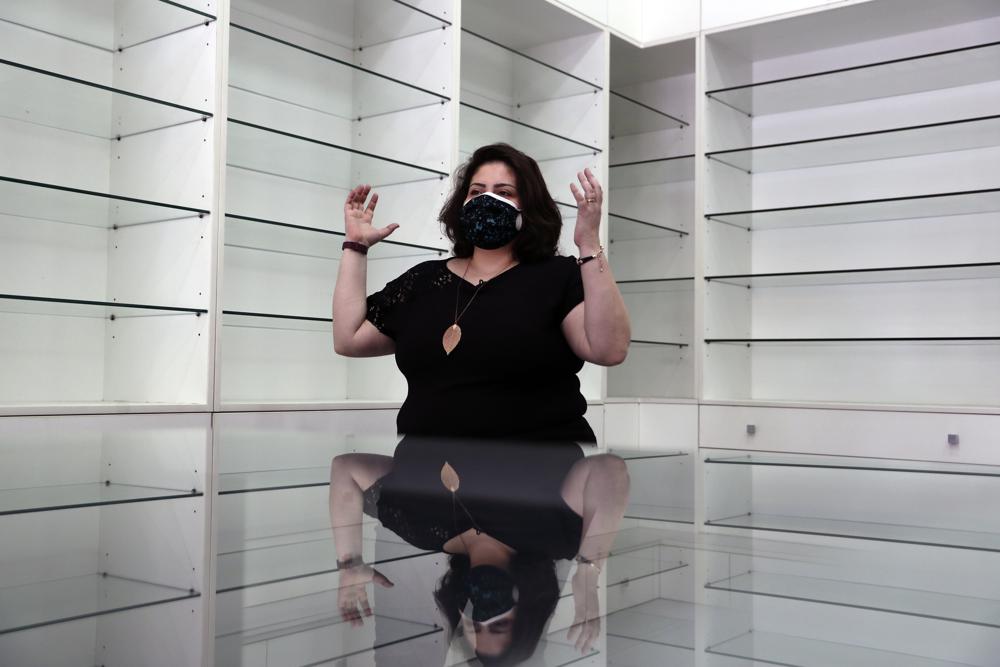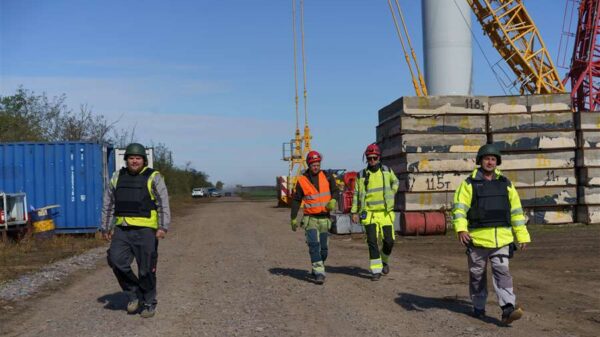Pharmacist Rita El Khoury speaks in the middle of her empty pharmacy after selling her stock in preparation for her move to France with her husband, in Ballouneh, north of Beirut, Lebanon, Wednesday, April 21, 2021. They are part of the latest wave of emigration in the small country’s tortured modern history, driven by financial ruin, collapsing institutions, hyperinflation and rapidly rising poverty. (AP Photo/Bilal Hussein)
BEIRUT, Lebanon (AP) — The shelves are bare at the Panacea pharmacy north of Beirut. Its owner, Rita El Khoury, has spent the past few weeks packing up her career, apartment and belongings before leaving Lebanon for a new life abroad.
For the 35-year-old pharmacist and her husband, and countless others feeling trapped in a country hammered by multiple crises, Lebanon has become unlivable.
Driven by financial ruin, collapsing institutions, hyperinflation and rapidly rising poverty, thousands have left since Lebanon’s economic and financial crisis began in late 2019 — an exodus that accelerated after the massive explosion at Beirut’s port last August, when a stockpile of improperly stored ammonium nitrates detonated, killing 211 people and destroying residential areas nearby.
Lebanon has been without a functioning government since, with political leaders deadlocked or complacent as the country hurtles toward total collapse. Fuel supplies are running out, leaving the country at risk of plunging into total darkness as power stations and generators run dry.
Now young to middle-aged professionals are leaving — doctors, engineers, pharmacists and bankers, part of the latest wave of emigration in the small country’s modern history.
“It’s been 10 years since I opened this pharmacy. I gave it all that I could,” said El Khoury, standing in her empty pharmacy. Though her career was her passion, she is armed with determination and hopes for a better future in France, where they are headed.
LEAVING OR STAYING
It’s a question almost every generation of Lebanese has asked throughout the country’s turbulent 100-year history, rife with instability and crises. The country has seen a ruinous 15-year civil war, military occupation by its neighbors, bombings, political assassinations and repeated bouts of civil unrest.
The result has been one of the world’s largest diasporas relative to the size of the country — estimated to be about three times the population of 5 million at home.
There are no exact figures for how many Lebanese have left since October 2019. Some estimate up to 20% of Lebanese doctors have emigrated or are planning to leave. Out of 3,400 unionized pharmacies, around 400 have shut down and 70% of pharmacy graduates end up leaving, said Ghassan al-Amin, head of the pharmacist syndicate.
Airport scenes of parents sending off their kids to work or study abroad are very common. During the civil war, which ended in 1990, tens of thousands of people left, joining previous generations of Lebanese immigrants to Latin America, Europe, Africa and Australia.
The current economic crisis is unprecedented in Lebanon’s modern history, and many worry the flight of educated professionals and soaring poverty this time would forever alter the identity and reputation this small country once had as the medical, tourist and banking capital of the Middle East.
El Khoury and her husband, Marcel, never wanted to leave, determined to remain close to their parents in a country that provides no social welfare for its elderly. She is an only child. Her husband has two brothers, both living in Dubai.
But their resolve to stay began to crack two years ago. The economy was tanking, and hard currency was becoming scarce. In October 2019, public frustration exploded into nationwide street protests. Banks clamped down. People suddenly saw their dollar bank accounts frozen and Lebanese currency withdrawals limited, trapping all their money. The Lebanese pound, pegged to the U.S. dollar for decades, unraveled. Salaries dropped and savings evaporated.
El Khoury’s husband, a financial software developer, started looking for jobs abroad, but then the pandemic hit, slowing everything down. The couple decided to apply for immigration to Canada and began the lengthy paperwork process.
By mid-year, drugs started disappearing from pharmacy shelves, shortages exacerbated by panic buying and suppliers holding on to the drugs, hoping to sell for higher. Six out of 10 brand-name drugs were suddenly unavailable.
“There were days when I came home crying,” El Khoury said. “When I was studying pharmacy for five years, they never told me I’d have to decide who gets to have medicine and who doesn’t.”
On Aug, 4 — the day the of the port explosion — she was working remotely from home when the earth shook, followed by a deafening blast. From their apartment north of Beirut’s port, she saw a gigantic cloud of smoke rising above the city.
The explosion triggered childhood memories during Lebanon’s civil war, when her parents had her sleep behind a sofa, hoping it would protect her from the shells.
The blast solidified the couple’s resolve to leave.
El Khoury now ridicules the word ‘resilience,’ often ascribed to Lebanese people for their ability to pick up the pieces and rebuild after every disaster.
“To me resilience is an excuse that we give ourselves for apathy and not doing anything,” she said. “Resilience is why we keep falling lower, and we get used to every new low.”
STARTING FROM ZERO
In January, El Khoury’s husband received a job offer in France. They decided to take it. She began selling her pharmacy stocks, and begin the long process of packing up a life in preparation for their departure on Saturday.
“We are going to start from zero,” she said. “Everything we have worked for the past 15 years, the money we have earned and saved, it’s all gone and we’re starting from scratch.”
They feel sadness, apprehension and nostalgia mixed with relief at finally taking the leap. They worry about leaving their parents behind in a country with an uncertain future but at the same time, there is excitement about what awaits.
El Khoury recalls the hope and enthusiasm she felt when she first opened her pharmacy. She had just returned from a year of study in France, and the pharmacy, she felt, was her mission. That mission was cut short, she said. Hopefully, a more dignified life in France awaits.
With family and friends left behind, ties with Lebanon would not be cut. She is already planning Sunday lunches with an open Skype connection between Paris and Beirut so they can stay connected with their parents. But the move, El Khoury feels, is permanent.
“It would take a miracle for us to come back here,” she said, then added: “A miracle or retirement.”
Copyright 2020 Associated Press. All rights reserved.





























